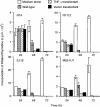Enhancing the immunotherapeutic potential of mycobacteria by transfection with tumour necrosis factor-alpha
- PMID: 10233685
- PMCID: PMC2326725
- DOI: 10.1046/j.1365-2567.1999.00667.x
Enhancing the immunotherapeutic potential of mycobacteria by transfection with tumour necrosis factor-alpha
Abstract
In an attempt to enhance the anti-tumour properties of mycobacteria we have developed recombinant forms of Mycobacterium smegmatis which express and secrete biologically active human tumour necrosis factor-alpha (TNF-alpha). This was achieved by transfecting M. smegmatis using shuttle plasmids incorporating the cDNA sequence for the human TNF-alpha mature peptide. In vitro experiments on a panel of human bladder tumour cell lines (EJ18, MGH-U1, RT4, RT112) indicate that our genetically modified mycobacteria are more effective than wild-type at inducing or up-regulating the expression of intracellular adhesion molecule-1 and the secretion of an array of proinflammatory cytokines [interleukin-1 (IL-1), IL-6, IL-8, granulocyte-macrophage colony-stimulating factor]. We have also demonstrated increased adhesion molecule and cytokine expression in response to mycobacteria transfected with vector containing no gene insert. However, this was not as pronounced as that observed following tumour cell stimulation by the TNF-alpha-transfected strain. In contrast, in three out of four tumour cell lines all M. smegmatis strains were found to down-regulate the secretion of the anti-inflammatory cytokine transforming growth factor-beta1. Our studies have also confirmed that M. smegmatis is a powerful inhibitor of bladder tumour cell growth and revealed that its antiproliferative potency is enhanced by transfecting with human TNF-alpha and, to a lesser extent, with vector alone. All M. smegmatis strains were effective in the activation of peripheral blood leucocyte cultures. However, no differences were observed in the ability of the TNF-alpha-transfected, mock-transfected and wild-type mycobacteria to induce tumour cell killing activity. These results suggest that the immunomodulatory effects of M. smegmatis can be enhanced by transfection with vectors which allow the secretion of human TNF-alpha, thus increasing mycobacterial immunotherapeutic potential.
Figures



Similar articles
-
Cytokine-modified Mycobacterium smegmatis as a novel anticancer immunotherapy.Int J Cancer. 2004 Nov 20;112(4):653-60. doi: 10.1002/ijc.20442. Int J Cancer. 2004. PMID: 15382047
-
The pMy vector series: A versatile cloning platform for the recombinant production of mycobacterial proteins in Mycobacterium smegmatis.Protein Sci. 2020 Dec;29(12):2528-2537. doi: 10.1002/pro.3962. Epub 2020 Oct 13. Protein Sci. 2020. PMID: 33006405 Free PMC article.
-
A two-plasmid system for stable, selective-pressure-independent expression of multiple extracellular proteins in mycobacteria.Microbiology (Reading). 2004 Jul;150(Pt 7):2143-2151. doi: 10.1099/mic.0.27113-0. Microbiology (Reading). 2004. PMID: 15256557
-
[Construction of recombinant Mycobacterium smegmatis expressing ESAT-6 and its effects on macrophages].Nan Fang Yi Ke Da Xue Xue Bao. 2006 Jul;26(7):923-6. Nan Fang Yi Ke Da Xue Xue Bao. 2006. PMID: 16864078 Chinese.
-
Production of recombinant proteins in Mycobacterium smegmatis for structural and functional studies.Protein Sci. 2015 Jan;24(1):1-10. doi: 10.1002/pro.2584. Epub 2014 Nov 13. Protein Sci. 2015. PMID: 25303009 Free PMC article. Review.
Cited by
-
Microorganisms and cancer: quest for a therapy.J Bacteriol. 2003 May;185(9):2683-6. doi: 10.1128/JB.185.9.2683-2686.2003. J Bacteriol. 2003. PMID: 12700245 Free PMC article. Review. No abstract available.
-
Bugs as drugs for cancer.Immunology. 2002 Sep;107(1):10-9. doi: 10.1046/j.1365-2567.2002.01498.x. Immunology. 2002. PMID: 12225358 Free PMC article. Review. No abstract available.
-
Th1 cytokine-secreting recombinant Mycobacterium bovis bacillus Calmette-Guérin and prospective use in immunotherapy of bladder cancer.Clin Dev Immunol. 2011;2011:728930. doi: 10.1155/2011/728930. Epub 2011 Sep 15. Clin Dev Immunol. 2011. PMID: 21941579 Free PMC article. Review.
-
Genetic alteration of Mycobacterium smegmatis to improve mycobacterium-mediated transfer of plasmid DNA into mammalian cells and DNA immunization.Infect Immun. 2007 Oct;75(10):4804-16. doi: 10.1128/IAI.01877-06. Epub 2007 Jul 30. Infect Immun. 2007. PMID: 17664267 Free PMC article.
-
Mycobacterium smegmatis, a Promising Vaccine Vector for Preventing TB and Other Diseases: Vaccinomics Insights and Applications.Vaccines (Basel). 2023 Jul 31;11(8):1302. doi: 10.3390/vaccines11081302. Vaccines (Basel). 2023. PMID: 37631870 Free PMC article. Review.
References
-
- Mathé G, Amiel J, Schwarzenberg L. Acute immunotherapy for acute lymphoblastoid leukemia. Lancet. 1969;I:697. - PubMed
-
- Morales A, Edinger D. Bacillus Calmette-Guérin in the treatment of adenocarcinoma of the kidney. J Urol. 1976;115:377. - PubMed
-
- Grant R, Cochran AJ, Hoyle D, et al. Results of administering BCG to patients with melanoma. Lancet. 1974;I:1096. - PubMed
-
- Lamm DL. Carcinoma In Situ. Urol Clin North Am. 1992;19:499. - PubMed
-
- Ratliff TL, Kavoussi LR, Catalona WJ. Role of fibronectin in intravesical BCG therapy for superficial bladder cancer. J Urol. 1988;139:410. - PubMed
Publication types
MeSH terms
Substances
LinkOut - more resources
Full Text Sources

